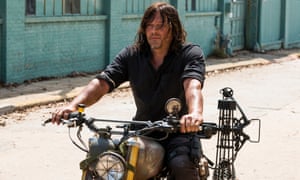When Walking Dead showrunner Scott M Gimple stated that season nine of AMC’s zombie hit would be “very much a new show”, he wasn’t joking. First came the announcement of his departure as series head, replaced by one of the show’s writers, Angela Kang. Then news broke of series stalwart Lauren Cohan’s exit, after lengthy contract negotiations allegedly failed to see her salary brought into line with those of her male co-leads, Andrew Lincoln (Rick) and Norman Reedus (Daryl). (Cohan’s Maggie will now appear in only six episodes of season nine’s 16, before she presumably comes to some grisly end.) And now the show looks set to weather its biggest storm yet, as Lincoln himself – very much the stubbly face of the franchise since its inception in 2010 – also announces his departure.
Like Cohan, Lincoln will be phased out over the coming season. If the show sticks to its tried-and-tested (see: predictable) formula, this almost certainly means Rick will kick the bucket in the mid-season finale. What’s less certain, and more worrying to the millions of devoted fans still tuning in after eight seasons of endless woe, is what direction the show will take once Rick is out of the picture.
The immediate outcome is that Norman Reedus’s Daryl Dixon will almost certainly step into Rick’s still-warm cowboy boots as the show’s primary focus, a theory backed up by reports that the actor is in negotiations for a $20m pay packet. Reedus – who, along with Lincoln and Melissa McBride (Carol), is one of the few actors remaining from season one – has been a fan favourite for as long as the show has been on air. With him front-and-centre, fans will keep watching. For now. Yet, though hoisting Daryl up to pole position in the credits undoubtedly makes sense from a business perspective, it’s also deceptively handy in terms of narrative, potentially allowing writers to sidestep one of the more awkward repercussions of Lincoln’s retirement.
The Walking Dead has always enjoyed an open relationship with its comic-book source material, mirroring plots faithfully right up until the point that it decides it doesn’t want to. The show isn’t afraid to deviate hugely from the comics to suit its purposes – one of the best examples is Carl’s death in season eight, which wasn’t in the comics at all. Rick, too, is still alive and well (well, alive at least) in the comics, so Lincoln’s departure will represent the biggest branching-off from Kirkman’s original storylines to date. Yet, because the character of Daryl isn’t even in the comics (he was created solely for Norman Reedus and the TV show), and Rick doesn’t have any family ties left besides baby Judith, subbing Daryl into Rick’s comic-book storylines will solve the writers two problems at once: they can continue to mine the comics for Rick’s narratives without having to come up with more ad-hoc storylines for Daryl. Win-win.

So the show’s immediate future, at least, seems safe. Problems only arise in its ambitions to, like the comics, keep going, and going for ever. With precious few players remaining from the original season, it seems inevitable that The Walking Dead will have to gamble on a grandfather’s axe-approach to its roster – with greater emphasis placed on events-led storylines rather than a soapy reliance on interactions between personalities we have come to know and love over the years. Characters will leave, new ones will replace them, and the show will continue in service of a greater overall arc. Because otherwise – besides Daryl, Michonne and Carol – the show would have to be carried by relatively new additions from the show’s shakier recent seasons, such as Jesus, Dwight and Ezekiel. And these characters simply don’t have it in them.
Ideally, The Walking Dead will do what it should have done years ago and break away from the source material entirely. Set an end point, possibly the eradication of the walker threat – the “cure” that was dangled and then abandoned in season one – and work towards that. Robert Kirkman has stated that no cure exists in the comics. If the TV show is to survive, it should ignore him completely. Lincoln and Cohan are gone. The show now rests squarely on the shoulders of Daryl, Carol and Danai Gurira’s Michonne. Gurira recently stole every scene she was in as Okoye in Black Panther, so her upping sticks and leaving The Walking Dead in favour of the Marvel gravy train isn’t an altogether unlikely proposition. The Walking Dead is quickly running out of characters we care about.
While it might go against the nihilistic ethos of the comics, wouldn’t it be better for the series to end on a high? Wrap it up at the end of the 10th season, with Reedus, McBride and Gurira still on board, and let viewers who have stuck with it for a decade enjoy some kind of emotional payoff? Reedus remains interested for the time being. Melissa McBride has also signed on for season nine. But you get the feeling the clock is ticking. Lincoln’s exit is evidence of that.
As a pale shadow of it former self, The Walking Dead could continue for another five seasons without Andrew Lincoln. The point is that, for it to take its place as one of the great TV dramas, it definitely shouldn’t.